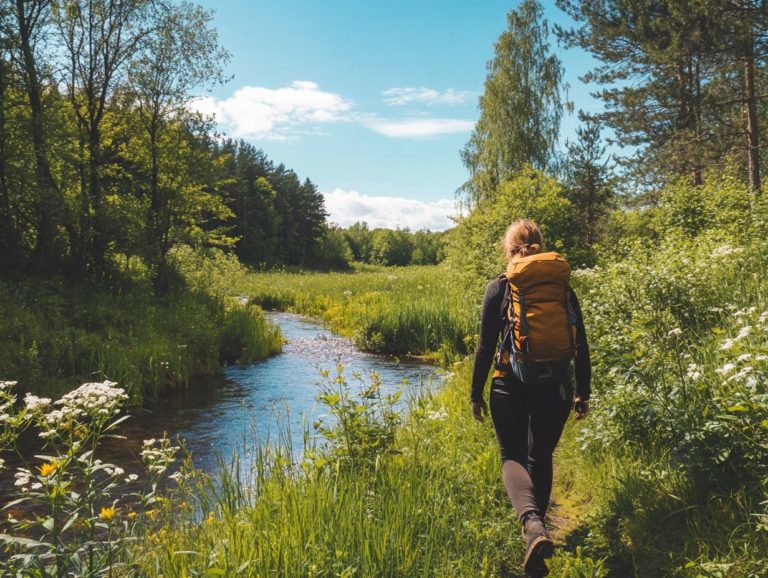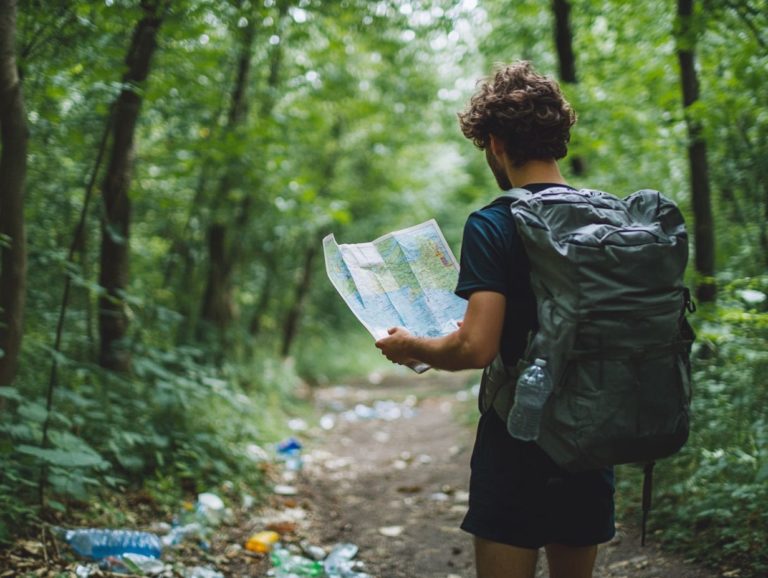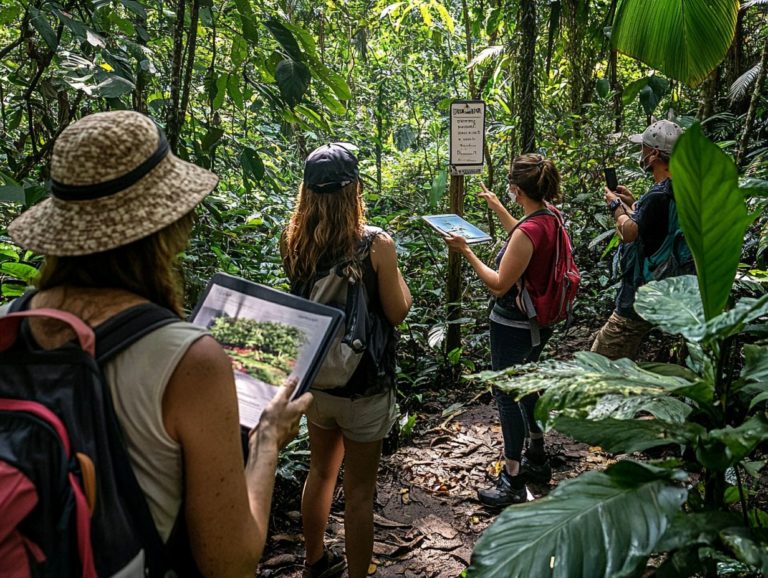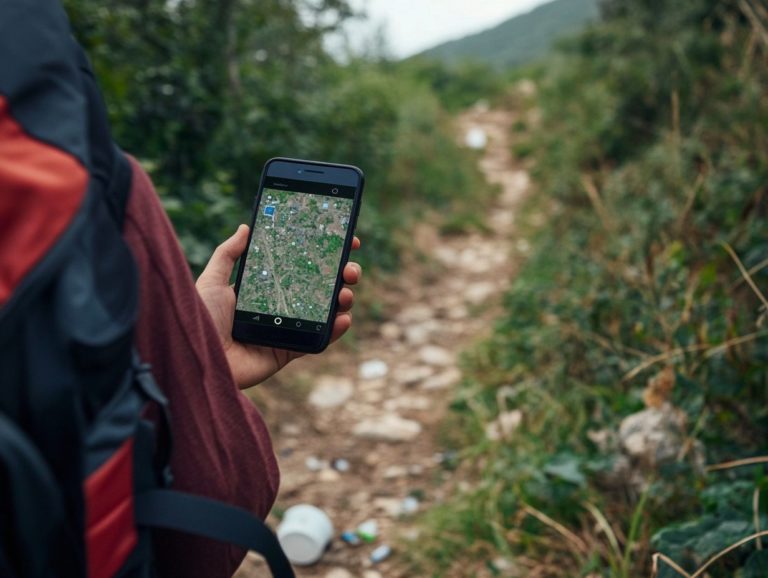How to Engage in Volunteer Travel Responsibly?
Volunteer travel presents an exceptional opportunity for you to immerse yourself in new cultures while positively impacting communities and the environment.
Let s dive into what volunteer travel means and why it matters. Engaging in this rewarding experience does come with its own set of responsibilities. This article highlights the importance of approaching it with an ethical mindset.
You ll find guidance on how to research and select the right program, prepare for your journey, and adopt best practices that ensure your contribution is both sustainable and meaningful.
Embark on a journey to discover how to travel with purpose!
Contents
- Key Takeaways:
- Understanding Volunteer Travel
- The Importance of Responsible Volunteer Travel
- Researching and Choosing a Volunteer Program
- Preparing for Volunteer Travel
- Best Practices for Responsible Volunteer Travel
- Ensuring Sustainable and Ethical Practices
- Frequently Asked Questions
- What is volunteer travel and why is it important to engage in it responsibly?
- How can I ensure that my volunteer travel experience is responsible?
- What are some common mistakes people make when engaging in volunteer travel?
- What are some ways I can make a positive impact while engaging in volunteer travel?
- Are there any ethical considerations I should keep in mind while engaging in volunteer travel?
- What are some resources I can use to learn more about responsible volunteer travel?
Key Takeaways:

- Understand the concept of volunteer travel and its impact on communities and the environment.
- Do thorough research and choose a responsible volunteer program, considering factors such as sustainability and ethical practices.
- Prepare appropriately for volunteer travel by packing responsibly and following best practices to make a positive impact and support local communities and cultures.
Understanding Volunteer Travel
Volunteer travel, commonly known as voluntourism, has become a prominent trend within the tourism sector. You can join meaningful volunteer projects through this type of travel, fostering community development and responsible tourism.
This approach enables you to engage in meaningful volunteer projects while immersing yourself in diverse cultures. It ensures that your journey leaves a positive mark on local communities and vulnerable children.
However, it is crucial to remain mindful of ethical practices and the potential risks of exploitation linked to certain projects, particularly orphanage tourism. This awareness ensures that your efforts are truly impactful and beneficial.
Defining the Concept
The concept of volunteer travel encompasses a variety of activities that allow you to immerse yourself in meaningful experiences. You engage in projects designed to promote ethical tourism and support local communities.
This approach not only enables you to contribute to social or environmental initiatives but also deepens your understanding of the cultures you encounter. By participating in community-driven programs like wildlife conservation or educational support you have the opportunity to create a positive impact while gaining invaluable insights into sustainability and interconnectedness.
To ensure your efforts are genuinely beneficial, critically assess the local organizations you collaborate with, considering community involvement and long-term goals. This thoughtful discernment enhances both your experience and the wellbeing of the host community.
The Importance of Responsible Volunteer Travel
Engaging in responsible volunteer travel is essential for ensuring that your positive contributions align with the needs of the community and support sustainable development initiatives. This mindful approach facilitates community development while nurturing cultural sensitivity and understanding.
It also enriches the experience for both you and the communities you serve.
Benefits to the Community and Environment
The benefits of responsible volunteer travel extend far beyond your personal experience; they create a ripple effect that positively impacts both the community and the environment through sustainable practices and collaboration with local organizations.
When you engage in such travel, you empower local communities by providing essential resources and support for vital projects, including education programs and environmental conservation initiatives. For example, in rural areas of South America, volunteers like you have played a crucial role in building schools and training educators, boosting literacy rates and fostering long-term economic stability.
Similarly, participating in beach clean-up projects in coastal regions has led to enhanced tourism and healthier marine ecosystems. This demonstrates how responsible actions can produce tangible outcomes. By aligning your volunteer efforts with community needs, you enrich your own life while cultivating a sense of partnership that paves the way for sustainable development.
Ready to make a difference? Start planning your volunteer travel adventure today!
Researching and Choosing a Volunteer Program

Choosing the right volunteer program is essential for a fulfilling experience. It should align with your goals and meet the community’s needs.
Conduct thorough research to assess potential projects. This way, you can identify placements that prioritize fairness and respect, promote cultural understanding, and maximize the long-term impact of your contributions.
Factors to Consider
When selecting a volunteer program, pay attention to critical factors such as ethical practices and community involvement. Also, consider how well the program aligns with your personal motivations for volunteering.
To ensure a meaningful experience, delve into the program’s ethical approach. Seek transparency in its operations and the treatment of both volunteers and beneficiaries. Understanding community needs is vital; programs should directly address local challenges and foster authentic relationships. For more insights, explore the ethics of volunteer travel.
Reflect on your personal motivations and skills. This alignment amplifies the impact of your efforts and enriches your experience. Engaging in a program that resonates with your values and passions often leads to greater fulfillment and a deeper connection to the cause.
Preparing for Volunteer Travel
Preparing for your volunteer travel requires a thoughtful approach. Start by crafting a meticulous packing list that aligns with your destination.
It s crucial to secure the right travel insurance to protect your experience. Immerse yourself in the cultural context of your destination to enrich your journey.
Don t overlook the importance of completing any necessary criminal background checks. These steps ensure the safety of the vulnerable children you ll be working with.
What to Pack and Expect
A well-prepared packing list is crucial for ensuring a seamless volunteer experience. Consider the cultural sensitivities and local customs of your destination.
As you travel to a new place, think beyond basics like clothing and toiletries. Consider specific items you’ll need for the volunteer work you’ll be involved in. Your packing essentials might include:
- First aid kits
- Reusable water bottles
- Tools relevant to your projects
Cultural considerations, such as local dress codes or traditions, can enhance your interactions with the community. Understanding expectations for your role will help you adapt quickly, and keeping an open mind will prepare you for any challenges that may arise during your stay.
Best Practices for Responsible Volunteer Travel
By implementing best practices in responsible volunteer travel, you ensure your efforts benefit the communities you engage with. Honor their unique cultures and traditions.
Foster collaboration with local organizations. Take time to understand volunteer motivations, as this enhances your contributions and supports community involvement.
How to Make a Positive Impact

Making a positive impact while volunteering requires understanding the community’s needs. Ensure your efforts align with ethical tourism practices.
Actively engage with local organizations to elevate your contributions. By fostering partnerships, you can pave the way for sustainable outcomes. This collaboration offers valuable insights into pressing issues and ensures that your initiatives are culturally sensitive and beneficial for the community.
Establish feedback mechanisms to assess the effectiveness of your actions. This allows you to refine your strategies and amplify your overall impact. Recognizing and adapting to the unique dynamics of the community creates lasting change that resonates well beyond your immediate involvement.
Ensuring Sustainable and Ethical Practices
Ensuring sustainable and ethical practices in volunteer travel is essential for safeguarding vulnerable children and effectively supporting local communities. This means you should prioritize transparency within volunteer organizations and establish robust child protection policies that place the well-being of those you seek to assist at the forefront of your efforts.
Supporting Local Communities and Cultures
Supporting local communities and cultures is at the heart of responsible volunteer travel. It’s about respecting cultural sensitivities while building a reciprocal relationship with the communities you serve.
By embracing ethical tourism practices, you not only contribute to sustainable development but also enrich the local culture and traditions. Imagine a group of volunteers engaged in an environmental conservation project in Costa Rica, collaborating with indigenous communities!
They merge traditional ecological knowledge with modern techniques, resulting in a thriving reforestation initiative.
When you participate in cultural exchange programs, you have the opportunity to facilitate workshops that celebrate local art forms. This allows community members to showcase their heritage while adding depth to your volunteer experience. Such respectful collaborations foster meaningful connections, ensuring that both you and the locals benefit in a truly enriching way.
Frequently Asked Questions
What is volunteer travel and why is it important to engage in it responsibly?
Volunteer travel, or voluntourism, is when you help while exploring a new place. It is important to engage in it responsibly because it can significantly impact local communities and the environment.
How can I ensure that my volunteer travel experience is responsible?

First, research the organization or program you want to volunteer with to ensure they have ethical and sustainable practices. Also, respect local customs and cultures, and work closely with the community to understand their needs and priorities.
What are some common mistakes people make when engaging in volunteer travel?
One common mistake is participating in activities that may do more harm than good, such as orphanage tourism. Another mistake is not educating oneself on the local community and their needs before participating in volunteer work, leading to projects that are not sustainable or necessary.
What are some ways I can make a positive impact while engaging in volunteer travel?
You can make a positive impact by volunteering with local organizations that are well-established and have a good track record of supporting the community. Prioritize projects that match your skills and expertise, and work closely with the community to ensure your efforts are needed and sustainable.
Are there any ethical considerations I should keep in mind while engaging in volunteer travel?
Think about how power affects relationships between you and the locals. Approach your experience with humility and a willingness to learn. Be mindful of the environmental impact of your activities and aim to leave a positive, sustainable footprint.
What are some resources I can use to learn more about responsible volunteer travel?
There are several websites and organizations that offer information and resources on responsible volunteer travel, such as Responsible Travel, Ethical Volunteering, and the Center for Responsible Travel. You can also reach out to past volunteers or join online communities to learn from their experiences.
Ready to make a difference? Start your research today!






